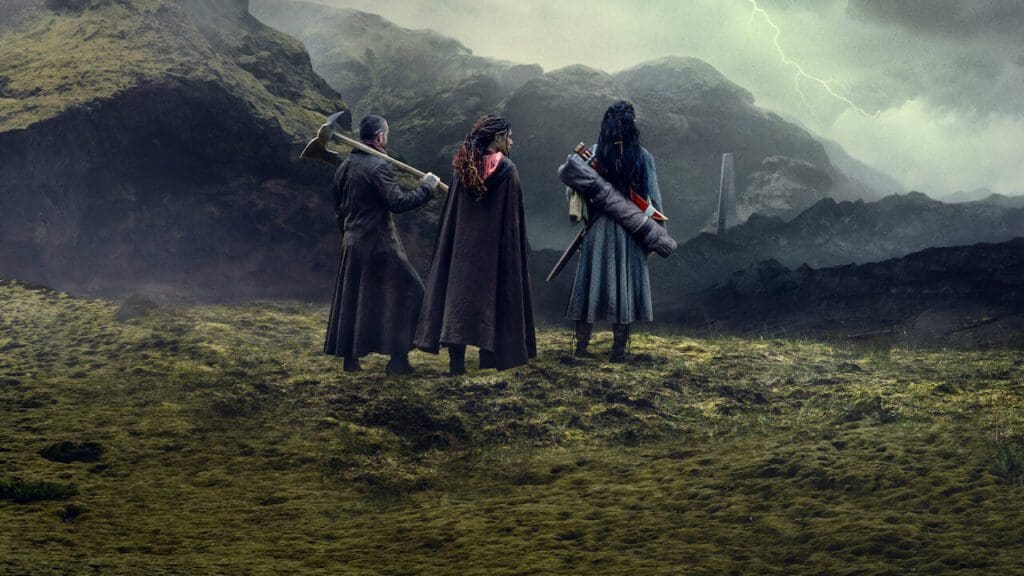Summary
Serviceable, pacey fantasy it may be, but The Witcher: Blood Origin seems to exist only to answer questions posited in other corners of the continuity, and its four slight episodes leave it feeling frustratingly undercooked.
This review of the The Witcher: Blood Origin season 1 does not contain spoilers.
Ask anyone what they love about the Witcher universe – a fantasy world inspired by Polish folklore, created in the literary works of Andrzej Sapkowski but popularised by CD Projekt Red’s indescribably popular video games – and they’ll invariably say Geralt of Rivia. Geralt is the Witcher, a mutant monster hunter with cat-like eyes and reflexes, a variety of silver and steel killing implements, a hardy constitution, and a broody attitude. There isn’t a beast he can’t kill or a scantily clad woman he can’t bed. Songs are sung about his exploits, and he has not one but two – the White Wolf and the Butcher of Blaviken, depending on who you ask – cool-sounding nicknames. They don’t hand those out for nothing.
But if Geralt is the quintessential fantasy leading man, what does Sapkowski’s setting look like without him? The Continent, as it’s called, is a sprawling land of war, magic, political intrigue, class strife, elves, dwarves, and monsters – but so is basically every other fantasy setting. The Witcher: Blood Origin, a new four-part prequel set 1200 years before the first season of the Netflix series, is a Witcher story without a Witcher, or at least without the Witcher, and it can’t help but suffer as a result.
The Witcher: Blood Origin review and plot summary
For anyone paying attention, this isn’t the franchise’s first spin-off on Netflix. In 2021 the streaming giant released The Witcher: Nightmare of the Wolf, an animated prequel that functioned as an origin story for Geralt’s mentor, Vesemir. That, though, was related closely enough to Geralt, and featured enough familiar characters and locations, to still feel like part of his story. Blood Origin doesn’t. Instead, it’s a detrimentally brisk explainer of a major mythological event known as the Conjunction of the Spheres – the TV equivalent, in a way, of a tangentially-related hyperlink that you end up clicking while reading about something else on Wikipedia.
Rumour has it that the show was originally intended to run for six episodes, and you can feel that in its sped-up characterization and plot beats. It’s about seven – count ‘em! – warriors with their own backstories and motivations and relationship dynamics, but it’s also about the Continent’s history, and about stylish swordfights and namechecking familiar fixtures of the mythology so fans can recreate that Leonardo DiCaprio meme. This is altogether too much for the space the show is afforded, and there’s a creeping frustration all throughout it that every potentially intriguing element and character is being short-changed.
And that’s a shame since this era of the Continent’s history is defined by elf supremacy. See, back in the day, humans and monsters didn’t exist in this land; instead, the elves, who in most stories in this franchise are a brutally persecuted underclass, run everything in a tight caste system. It isn’t an idyllic utopia, but a complex hierarchy of haves and have-nots, with the lowborn everyday folks toiling to get by while the royals and their ilk scheme and stab each other in the back. When we’ve heard it discussed by wistful elves trampled under the boot of human oppression, this so-called Golden Age of the Elder Races sounded a lot more pleasant than what’s depicted here.
But such is the nature of stories, and that idea is a prevalent theme throughout Blood Origin, which is needlessly framed by Jaskier (Joey Batey), Geralt’s bard best friend, being told the story we’re seeing play out by a Seanchaí, played by Minnie Driver in the show’s most thankless part. But the point is clear. Stories – of history, of culture – are important. They’re how we shape our view of the world, how we know where we came from and how we can imagine where we might be going. The same idea is echoed again and again, the importance of controlling the narrative, and reality along with it. History, after all, is written by the victors.
It’s no coincidence then that the ostensible protagonist of Blood Origin is, like Jaskier, another storyteller. But Éile (Sophia Brown) isn’t just a bard whose songs have earned her a seemingly global reputation as “the Lark”; she’s also a former member of Raven Clan, a badass elf sect tasked with protecting the royal family of Pryshia. The kingdom of Xin’trea has a similar cabal of warrior protectors, Dog Clan, and when their best fighter, Fjall (Laurence O’Fuarain), is exiled for doing the no-pants dance with the princess, Merwyn (Mirren Mack), he teams up with Eile in a fight against an empire that has betrayed them both.
They find several allies in Scian (Michelle Yeoh, awesome as always), a Ghost Clan sword master turned sellsword, celestial twins Syndril (Zach Wyatt) and Zacare (Lizzie Annis), the cleaver-wielding Callan (Huw Novelli), whose nickname is “Brother Death”, and a dwarf named Meldof (Francesca Mills) whose hammer, Gwen, was forged with the ashes of her dead lover. I liked all of these characters enough that I couldn’t help but lament how little they matter, how unsatisfactorily their personal perspectives are explored, and how much more could have been done with each of them.
More focus, arguably, is placed on the villains, especially after a coup – which is admittedly quite unexpected in its details – begins to threaten the entire world thanks to the magic of the now-familiar monoliths. A self-serving lowborn mage, Balor (Lenny Henry, becoming a permanent fixture in such things after Rings of Power), is the most obvious baddie, but there are many conflicting agendas within the royal court, and fans will quickly notice the name Eredin (Jacob Collins-Levy), given the character will one day grow up to be the commander of the Wild Hunt and the overarching antagonist of the entire franchise.
But enough about the plot. While all this is undeniably interesting for fans, the particulars are constantly undercut by the pacing and what seems to be a minimum action quota, meaning that the show bends over backward to accommodate as many fast-paced, bloody swordfights as possible, even when that time would have been better spent on important characterization and worldbuilding. There are at least two romances – arguably three if you include Meldof and Gwen – that feel totally underserved, and one of them is utterly integral to the plot. There are entire character histories that are barely addressed, subplots that are teased and then abandoned, and themes that are toyed with but never doubled down on. The particulars leading to the multiversal cataclysm that the entire show is about are frustratingly vague, relying on our understanding of the monoliths and portal travel from other parts of the mythology – which some viewers might not even have – to fill in the blanks of a story that seems to exist entirely to answer questions posited elsewhere.
Is The Witcher: Blood Origin worth watching?
The question of whether The Witcher: Blood Origin is worth watching is going to be difficult to answer. For fans of the universe, it’ll be required viewing anyway, especially given how many cheeky Easter Eggs and nods to other corners of the continuity it contains. But even from a fan’s perspective, this feels slight and somewhat cynical, existing as a function of a wider mythology – and a streaming giant’s multimedia marketing drive – rather than a story worth telling on its own terms. For anyone who isn’t already well-versed in the franchise, it’s impossible to recommend, and jumping on here would be a terrible mistake for most.
I still love this universe and I’m not willing to write off the current and future screen adaptations of it just yet, but for a series so obsessed with the power and importance of storytelling, it’s shocking just how much this one misunderstands the basics of it.
What did you think of The Witcher: Blood Origin season 1? Comment below.
You can watch this series with a subscription to Netflix.
More Stories



